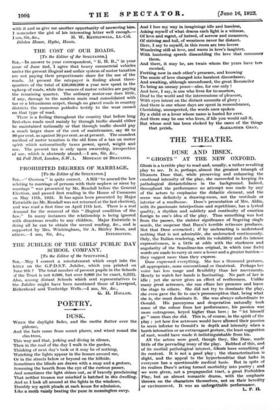THE THEATRE.
DUSE AND IBSEN.
" GHOSTS " AT THE NEW OXFORD.
Ghosts is a terrible play to read and, usually, a rather revolting play to see. It is, perhaps, almost the greatest triumph of Eleanora Duse that, while preserving and enhancing the emotional intensity of the play, she succeeded in keeping its pathological distastefulness in the background. Indeed, throughout the performance no attempt was made by any of the actors to emphasize the didactic element, and the scene was definitely a drawing-room, not the vestibule or interior of a madhouse. Duse's presentation of Mrs. Aldin, with its passionate interjections and repetitions, has a lyrical quality, a rhythm and subtlety and continuity of emotion foreign to one's idea of the play. Thus something was lost from the pauses, the sinister significance of lingering single words, the suspense that Ibsen's terrible reticence produces. Not that Duse overacted ; if by underacting is understood nothing that is not admirable, she underacted continuously. Only, the Italian rendering, with its volubility and its intense expressiveness, is a little at odds with the starkness and angularity of the Scandinavian original, in which (one feels) words are made to carry at once a lesser and a greater burden— they suggest more than they express.
Duse expressed everything. She has a thousand gestures, all appropriate, none conventional or theatrical. Perhaps her voice haS less range and flexibility than her movements. Merely to watch her hands is fascinating. No part of her is idle ; yet she never gives an effect of restlessness. Unlike many great actresses, she can efface her presence and leave the stage to others. She did not try to dominate the play, she even gave the lie to one's preconception that, being what she is, she must dominate it. She was always subordinate to Oswald. His paroxysms and desperation naturally took some of the colour from her performance, his passion was more outrageous, keyed higher than hers ; he " let himself go " more than she did. This is, of course, in the spirit of the play ; yet how few actresses would have allowed their passion to seem inferior to Oswald's in depth and intensity when a harsh intonation or an extravagant gesture, the least suggestion of rant, would have made it indistinguishable from his.
All the actors were good, though they, like Duse, made little of the pervading irony of the play. Robbed of this, and of its morbid pathological interest, Ghosts loses something of its content. It is not a good play ; the characterization is slight, and the appeal to the hypochondriac that lurks in everyone has a questionable medical basis. But in spite of its realism Duse's acting turned morbidity into poetry ; and we were given, not a propagandist tract, a great Forbidden Play, but an almost romantic drama, with the emphasis thrown on the characters themselves, not on their heredity or environment. It was an unforgettable performance.
L. P. H.






































 Previous page
Previous page